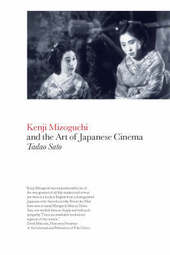
|
Kenji Mizoguchi and the Art of Japanese Cinema
Hardback
Main Details
| Title |
Kenji Mizoguchi and the Art of Japanese Cinema
|
| Authors and Contributors |
Edited by Latika Padgaonkar
|
|
Translated by Brij Tankha
|
|
Edited by Aruna Vasudev
|
|
By (author) Tadao Sato
|
| Physical Properties |
| Format:Hardback | | Pages:259 | | Dimensions(mm): Height 234,Width 156 |
|
| Category/Genre | Individual film directors and film-makers
Asian and Middle Eastern history |
|---|
| ISBN/Barcode |
9781847882318
|
| Classifications | Dewey:791.430233092 |
|---|
| Audience | | Tertiary Education (US: College) | |
|---|
| Illustrations |
35 illustrations
|
|
Publishing Details |
| Publisher |
Bloomsbury Publishing PLC
|
| Imprint |
Berg Publishers
|
| Publication Date |
1 June 2008 |
| Publication Country |
United Kingdom
|
Description
Kenji Mizoguchi is one of the three acclaimed masters - together with Yasujiro Ozu and Akira Kurosawa - of Japanese cinema. Kenji Mizoguchi and the Art of Japanese Cinema is the definitive guide to the life and work of one of the greatest film-makers of the twentieth century.Born at the end of the nineteenth century into a wealthy family, Mizoguchi's early life influenced the themes he would take up in his work. His father's ambitious business ventures failed and the family fell into poverty. His mother died and his elder sister was obliged to enter a geisha house to support the family. Her earnings paid for Mizoguchi's education. Weak and deluded men and strong, self-sacrificing women - these were to become the obsessive motifs of Mizoguchi's films.Mizoguchi's apprenticeship in cinema was peculiarly Japanese. His concerns - the role of women and the realist representation of the inequities of Japanese society - were not. Through two World Wars, Japan's culture changed. Though censored, Mizoguchi continued to produce films. It was only in the 1950s that Mizoguchi's astonishing cinematic vision became widely known outside Japan.Kenji Mizoguchi and the Art of Japanese Cinema tells the full story of this famously perfectionist, even tyrannical, director. Mizoguchi's key films, cinematographic techniques and his social and aesthetic concerns are all discussed and set in the context of Japan's changing popular and political culture.
Author Biography
Tadao Sato is one of Japan's most prestigious film critics. He has written on many of the great masters of Japanese cinema - Akira Kurosawa, Yasujiro Ozu, Nagisa Oshima, Shohei Imamura - as well as on Asian and global cinema more generally. He is currently the President of the Japan Academy of Moving Images. Edited by Aruna Vasudev and Latika Padgaonkar Translated from the Japanese by Brij Tankha
Reviews'Kenji Mizoguchi was unquestionably one of the very greatest of all film-makers and now at last there is a book in English from a distinguished Japanese critic that tells us why. Few in the West have seen so many Mizoguchi films as Tadao Sato, nor studied them so deeply and with such sympathy. This is an invaluable book about a genius of the cinema.' Derek Malcolm, Honorary President of the International Federation of Film Critics REVIEWS OF MIZOGUCHI'S WORK 'One of the 20th century's greatest filmmakers' New York Times 'On equal terms with Eisenstein, Griffith and Renoir' Jean-Luc Godard 'The Japanese director I admire the most' Akira Kurosawa 'No praise is too high for him' Orson Welles 'He is capable of going beyond the limitations of coherent logic, and conveying the deep complexity and truth of the impalpable connections and hidden phenomena of life' Andrei Tarkovsky 'The greatest of all cineastes' Cahiers du Cinema 'When the name Kenji Mizoguchi is intoned, every piece of camera equipment on earth should execute a deep bow. Mizoguchi's gentle but unwavering camera nurtures and observes his characters' often tragic lives with an emotionalism that is, paradoxically, as intense as any committed to film, yet free of melodrama.' The New York Sun 'With Mizoguchi, form and idea, atmosphere and feeling are indivisible ... his films are assembled out of images of breathtaking exactness ... a world which irresistibly captures and enfolds the spectator' The Times 'If you have never witnessed the visual equivalent of perfect pitch, or understood how a single tracking shot can feel like a declaration of faith, here is your chance. Mizoguchi's work may brim with the fears of a fatalist, yet it also gleams with unexpected hope.' The New Yorker 'If any art has justified this medium, so often crude, thoughtless and mundane, it is the art of Kenji Mizoguchi.' Senses of Cinema 'Japan's Kenji Mizoguchi is more than simply pantheonworthy (and superior to his better-known peers Akira Kurosawa and Yasujiro Ozu). He's absolutely necessary.' Time Out New York 'This man they call Mizoguchi is an idiot' Kenji Mizoguchi
|